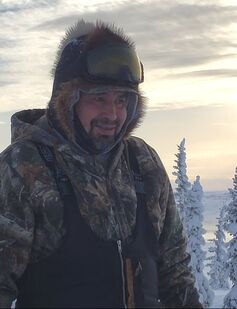|
This is part of a series of profiles about the staff, leaders, and community members who are hard at work implementing Łutsël K’é Dene First Nation's vision for the Thaidene Nëné Indigenous Protected Area. You can read the other profiles here.  Paul Catholique is the newest Ni Hat’ni Dene guardian. Paul brings a wealth of experience living and working on the land to the crew. For a decade, he spent his summer months working as a guide at Frontier Fishing Lodge, showing guests the best fishing spots on Tu Nedhé (Great Slave Lake) and sharing the history and the culture of the area with them. He also spent ten years working for forestry, first as a fire crew member and later as a crew boss and supervisor. In between contracts, Paul would hunt and trap, using the skills he learned from his father, John Catholique (his mother is Bertha Collins [Tłı̨chǫ]). “From a young age, we went trapping,” he says, often working out of a cabin on Ts’ǫ Ɂáı Tué (Noman Lake). His uncle, Antoine Michel, also played a critical role in teaching Paul how to live off the land, especially beyond the treeline. “He used to take us out to the barrenlands every year,” Paul recalls. “As soon as it was frozen, we would go to the barrenlands by skidoo. We went often, sometimes three to fifteen times a year.” Paul credits his uncle Antoine with teaching him to navigate in the springtime, when it’s more dangerous to travel on the land—“You have been really knowledgeable at that time of year,” he says—and also with showing him the old routes and roads. Equally important to his education as a harvester and land user was knowledge shared by Łutsël K’é Dene elders: “When I was in town, I would listen to the elders talk and tell stories.” His greatest teacher, though, was the land itself. In Paul’s words, “I learned from going all over on the land, trapping, travelling, and just living on the land.” When asked about his favourite places in Thaidene Nëné, almost all of Paul’s picks are beyond the treeline: Ɂedacho Tué (Artillery Lake), Dené Bésda Tué Chogh (Fletcher Lake), Ɂejëre K’áanı́ Tué (Campbell Lake), and K’ásba Dezé (Ptarmigan River). Contrary to the image suggested by the name barrenlands, Paul see the tundra as a place of abundance, “Everything I need is there.” Hazú (tundra) is also special because of the connection to his ancestors. Paul’s great-grandfather Gahdële is buried on Ɂedacho Tué. Paul wanted to be a Ni Hat’ni Dene guardian because the job description is basically his life. “This position was made for me,” he says. More than this, Paul, like many in the community, wants to protect the land and Ni Hat’ni Dene play a critical role in that. “We need to protect the land, the water, the animals, the trees,” Paul explains. “We need to protect the old campsites, the old burial sites.” Working alongside the other guardians, Paul will be responsible for mentoring the summer students. By creating hands-on learning opportunities, he notes, Ni Hat’ni Dene “can help make it safer to send younger people out on their land.” Being a skilled and conscientious land user is important to Paul; so is modelling Łutsël K’é Dene values. As just one example, he notes that “Ni Hat’ni are teaching young people how to put nets in the water, so they can share the fish with the community, with the elders.” Paul also sees the important role that Ni Hat’ni Dene play in welcoming visitors to Thaidene Nëné, while also teaching them how to live and travel safely on the land. “The things we teach the young people are good for visitors too,” he says. “We don’t want them to be left out. Everybody is welcome.” Comments are closed.
|
AuthorWrite something about yourself. No need to be fancy, just an overview. Archives
July 2024
Categories |
CONNECT |
VISIONWe are the Lutsel K’e Dene First Nation. Our vision for Thaidene Nëné is:
Nuwe néné, nuwe ch'anıé yunedhé xa (Our land, our culture for the future). We’re working with our partners to permanently protect Thaidene Nëné—part of our huge and bountiful homeland around and beyond the East Arm of Tu Nedhé. |
